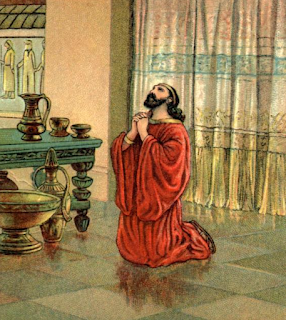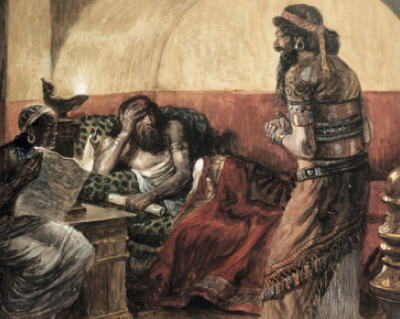TO CHEW ON: "Then Joseph her husband, being a just man and not wanting to make her a public example, was minded to put her away secretly." Matthew 1:19
Joseph has always intrigued me. I think of him as thoughtful and deep, the strong, silent type. Here he faced the dilemma of his life: his beautiful fiancee was pregnant.
My Bible's study notes explain about Jewish betrothals:
"In Jewish law, betrothal involved a formal binding contract before witnesses but the betrothal abstained from sexual relations and the woman remained at her father's house until the actual wedding ceremony. The betrothed referenced each other as husband and wife (vs. 19,20), and the contract could be terminated only by death or a formal divorce decree" - J. Lyle Story, New Spirit Filled Life Bible, p. 1290.Did the culture allow private conversations between engaged young people? If it did, I can imagine Mary's explanation, probably tearful (how could you not be emotional when the love of your life, the man who had your future in his hands, was looking at you with utter shock, disbelief and...revulsion?) even though this was a holy, joyful thing that had happened to her.
What to do? Joseph was considering putting her away secretly—divorcing her—the solution described in Deuteronomy 24:1. But just in time, "while he thought about these things" an angel appeared to Joseph in a dream to confirm Mary's claim that this baby was indeed what she had said and not the fruit of a sinful union. So Joseph married her and the rest of the story played out.
Have you noticed how God showing up here just in the nick of time, just as He often comes to us in our emergencies. It never feels soon enough for our likes, but neither is it too late for the situation. God could have alerted Joseph to what was about to happen before any of it transpired, saving him the stress, worry, and crisis. But He didn't. Why? I believe it was because God was developing Joseph's faith at the same time He was working out His plans for the earth in sending Jesus.
God's response to Joseph reminds me of some paragraphs I came across in J. I. Packer's Knowing God. Packer, speaking of another Joseph and his reaction to his brothers in Genesis 45:4-8 says:
"Once again we are confronted with the wisdom of God ordering the events of a human life for a double purpose: the man's own personal sanctification and the fulfilling of his appointed ministry and service in the life of the people of God....
These things are written for our learning: for the same wisdom which ordered the paths which God's saints trod in Bible times orders the Christian's life today. We should not therefore be too taken aback when unexpected and upsetting and discouraging things happen to us now. What do they mean? Why, simply that God in His wisdom means to make something of us which we have not attained yet, and is dealing with us accordingly....
But how are we to meet these baffling and trying situations if we cannot for the moment see God's purpose in them? First by taking them as from God, and asking ourselves what reactions to them, and in them, the gospel of God requires of us; second by seeking God's face specifically about them" J. I. Packer, Knowing God, pages 103-105, 1975 edition (emphasis mine).
*************
Unless otherwise noted all Scripture quotations are taken from the New King James Version®. Copyright © 1982 by Thomas Nelson, Inc. Used by permission. All rights reserved.




















